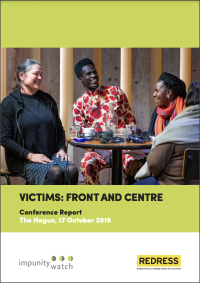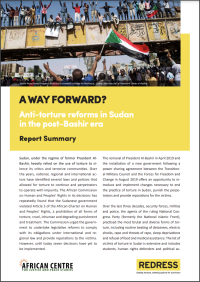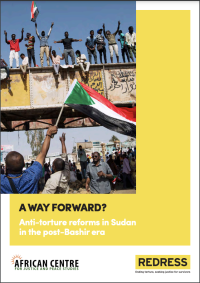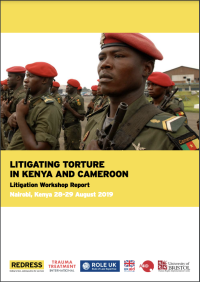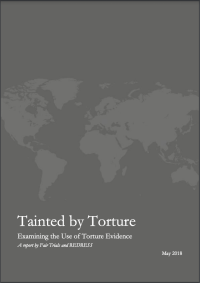Publications
REDRESS’ publications are also available in hard copy format. Please contact us for further information on [email protected].
This letter expresses REDRESS' concern about the possible transfer out of prison of former Sudanese President, Omar Al-Bashir, and other former regime members, in light of the COVID-19 health emergency. While REDRESS strongly supports measures to protect detained individuals’ rights to health and personal integrity, Covid-19 must not be a pretext for the unjustified release of those facing charges for serious international crimes. REDRESS calls upon all decision-making authorities in Sudan, especially the office of the Attorney-General, to ensure respect for the rights of victims to justice and reparation, while upholding the rights of detainees to health and safe conditions of detention.
Victims, activists and policymakers from different countries gathered in The Hague on 17 October 2019 to participate in the international conference Victims: Front and Centre, co-organised by Impunity Watch and Redress. Discussions focused on how to engage victims and ensure their meaningful and effective participation in transitional justice processes, particularly in the context of Guatemala and Uganda. The victims of the armed conflicts described how they had turned their pain into activism. The event also highlighted the importance of victim agency and empowerment through victims networks and other forms of support. Other experts brought perspectives from different contexts including Syria and Bosnia, reinforcing the importance of victim participation in shaping and strengthening transitional justice processes.
This Report Summary summarizes the key findings of a joint report by the African Centre for Justice and Peace Studies (ACJPS) and REDRESS, A Way Forward? Anti-torture reforms in Sudan in the Post-Bashir era. At a critical juncture in Sudan's history, the report identifies priorities for change and key reforms to end the systematic practice of torture in Sudan, punish the perpetrators and provide reparations for the victims.
At a critical juncture in Sudan’s history, this joint report from the African Centre for Justice and Peace Studies (ACJPS) and REDRESS identifies priorities for change and key reforms to end the systematic practice of torture in Sudan, punish the perpetrators and provide reparations for the victims.
In this letter, submitted ahead of the 42nd regular session of the UN Human Rights Council, REDRESS and other civil society organisations urge the Council to take action to address serious human rights violations and abuses that have been and continue to be committed in Sudan, and to support systemic reforms in the country.
This is a report of a Litigation Workshop that took place in Nairobi on 28-29 August 2019 involving lawyers and medical professionals from Kenya and Cameroon and the Gambia, led by REDRESS with the involvement of Trauma Centre International, the Independent-Medico-Legal Unit, the Human Rights Implementation Centre within the Law School of the University of Bristol, and Three Crowns. The workshop was designed to look in particular at the strategies and tactics for implementing judgments, and utilizing a collaborative approach between medical and legal professionals to seek justice for victims of torture.
REDRESS and the African Centre for Justice and Peace Studies (ACJPS) have issued this briefing which identifies priority areas for reform on torture in Sudan following the recent removal of Omar al-Bashir as President. It focuses on reparations for victims of torture, ensuring individual accountability and preventing torture in the future.
This report, written by REDRESS and Fair Trials, reveals that state authorities continue to rely routinely on evidence obtained through torture in criminal cases by looking at the law and practice in 17 countries from Europe, Asia-Pacific, Africa and the Americas.

